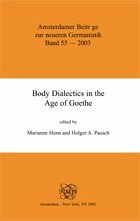In opposition to an essentialist conceptualization, the social construct of the human body in literature can be analyzed and described by means of effective methodologies that are based on Discourse Theory, Theory of Cultural Transmission and Ecology, System Theory, and Media Theory. In this perspective, the body is perceived as a complex arrangement of substantiation, substitution, and omission depending on demands, expectations, and prohibitions of the dominant discourse network. The term Body-Dialectics stands for the attempt to decipher - and for a moment freeze - the web of such discursive arrangements that constitute the fictitious notion of the body in the framework of a specific historic environment, here in the Age of Goethe.
Table of contents:
Marianne HENN and Holger A. PAUSCH: Introduction: Genealogy and Construction of Body Identity in the Age of Goethe
Daniel PURDY: Sculptured Soldiers and the Beauty of Discipline: Herder, Foucault and Masculinity
Karin A. WURST: Designing the Self: Fashion and the Body
Marjanne E. GOOZÉ: Posing for Posterity: The Representations and Portrayals of Henriette Herz as "Beautiful Jewess"
Holger A. PAUSCH: Beobachtungen zur Genealogie der Körperfeindlichkeit als Erbmangel und Notwendigkeit im kulturellen Gedächtnis der Aufklärung
Karin BARTON: Apum Rex/Regina: Goethes Bienenlehre als Schlüssel zu Wilhelm Meisters Wanderjahren
Stefani ENGELSTEIN: Reproductive Machines in E.T.A. Hoffmann
Sophie BOYER: "Das Mark aus meinem Rückgrat trank / Ihr Mund mit wildem Saugen": le corps vampirique chez Heinrich Heine ou l'échange symbolique de l'amour et de la mort
Gaby PAILER : " ... was verliert das Vaterland durch ein Weib ? " Krieg, Körperpolitik und Gender in Wilhelmine von Gersdorfs Drama Die Horatier und Curiatier (1790)
Daniel J. KRAMER: Winckelmann's Impact on Drama Prior to Goethe's Iphigenie: Joseph Bernard Pelzel's Das gerächte Troja
Andrea HEITMANN: Körperlichkeit und Sexualität in Sophie von La Roches Geschichte des Fräuleins von Sternheim
Alexander MATHÄS: Colonising the German Body: Self and Other in Sturm und Drang Drama
K. F. HILLIARD: Atemübungen: Geist und Körper in der Lyrik des 18. Jahrhunderts
Heather Merle BENBOW: Goethe's Die Wahlverwandtschaften and the Problem of Feminine Orality
Hans-Günther SCHWARZ: "Welle" und "Locke". Goethes déréaliser im West-östlichen Divan
Elisabeth KRIMMER : "Die allmähliche Verfertigung des Geschlechts beim Anziehen". Epistemologies of the Body in Kleist's Die Familie Schroffenstein
Matthew POLLARD: Reading and Writing the Architecture of the Body in Kleist's Penthesilea
William C. REEVE: Kleist, Büchner, Grillparzer: Three Dramatists' Archetypal Representations of the Body
Jane V. CURRAN: Bodily Grace and Consciousness: from the Enlightenment to Romanticism
Appendix: Wilhelmine von Gersdorf: Die Horatier und Curiatier, eine dramatische Skizze aus der römischen Geschichte. Herausgegeben von Gaby Pailer
Table of contents:
Marianne HENN and Holger A. PAUSCH: Introduction: Genealogy and Construction of Body Identity in the Age of Goethe
Daniel PURDY: Sculptured Soldiers and the Beauty of Discipline: Herder, Foucault and Masculinity
Karin A. WURST: Designing the Self: Fashion and the Body
Marjanne E. GOOZÉ: Posing for Posterity: The Representations and Portrayals of Henriette Herz as "Beautiful Jewess"
Holger A. PAUSCH: Beobachtungen zur Genealogie der Körperfeindlichkeit als Erbmangel und Notwendigkeit im kulturellen Gedächtnis der Aufklärung
Karin BARTON: Apum Rex/Regina: Goethes Bienenlehre als Schlüssel zu Wilhelm Meisters Wanderjahren
Stefani ENGELSTEIN: Reproductive Machines in E.T.A. Hoffmann
Sophie BOYER: "Das Mark aus meinem Rückgrat trank / Ihr Mund mit wildem Saugen": le corps vampirique chez Heinrich Heine ou l'échange symbolique de l'amour et de la mort
Gaby PAILER : " ... was verliert das Vaterland durch ein Weib ? " Krieg, Körperpolitik und Gender in Wilhelmine von Gersdorfs Drama Die Horatier und Curiatier (1790)
Daniel J. KRAMER: Winckelmann's Impact on Drama Prior to Goethe's Iphigenie: Joseph Bernard Pelzel's Das gerächte Troja
Andrea HEITMANN: Körperlichkeit und Sexualität in Sophie von La Roches Geschichte des Fräuleins von Sternheim
Alexander MATHÄS: Colonising the German Body: Self and Other in Sturm und Drang Drama
K. F. HILLIARD: Atemübungen: Geist und Körper in der Lyrik des 18. Jahrhunderts
Heather Merle BENBOW: Goethe's Die Wahlverwandtschaften and the Problem of Feminine Orality
Hans-Günther SCHWARZ: "Welle" und "Locke". Goethes déréaliser im West-östlichen Divan
Elisabeth KRIMMER : "Die allmähliche Verfertigung des Geschlechts beim Anziehen". Epistemologies of the Body in Kleist's Die Familie Schroffenstein
Matthew POLLARD: Reading and Writing the Architecture of the Body in Kleist's Penthesilea
William C. REEVE: Kleist, Büchner, Grillparzer: Three Dramatists' Archetypal Representations of the Body
Jane V. CURRAN: Bodily Grace and Consciousness: from the Enlightenment to Romanticism
Appendix: Wilhelmine von Gersdorf: Die Horatier und Curiatier, eine dramatische Skizze aus der römischen Geschichte. Herausgegeben von Gaby Pailer

